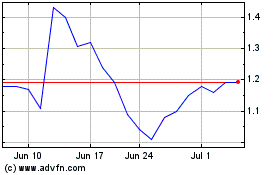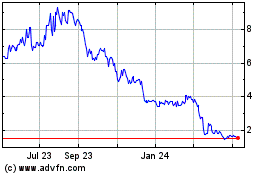Threshold Pharmaceuticals Announces New Clinical Data on TH-302 & Avastin(R) (Bevacizumab) in Recurrent Glioblastoma Followin...
November 22 2013 - 7:00AM
Marketwired
Threshold Pharmaceuticals Announces New Clinical Data on TH-302 and
Avastin(R) (Bevacizumab) in Recurrent Glioblastoma Following
Bevacizumab Failure
Data to Be Presented at the 2013 WFNO/SNO Meeting
SOUTH SAN FRANCISCO, CA--(Marketwired - Nov 22, 2013) -
Threshold Pharmaceuticals, Inc. (NASDAQ: THLD), today announced
early data from the Phase 1 portion of an investigator-sponsored
Phase 1/2 trial of its investigational hypoxia-targeted drug TH-302
in combination with Avastin® (bevacizumab) in patients with
recurrent glioblastoma following bevacizumab failure (Study 4003).
No dose-limiting toxicity has been reported to date at doses of
TH-302 up to 670 mg/m2 plus bevacizumab at 10 mg/m2 every two
weeks. Preliminary data in 14 patients showed TH-302 in combination
with bevacizumab was associated with a median time to progression
of 2.8 months. One patient achieved a complete response and two
patients achieved partial responses. The data will be presented
this evening from 7 p.m. to 9 p.m. at the 4th Quadrennial World
Federation of Neuro-Oncology (WFNO) meeting held in conjunction
with the 18th annual 2013 Scientific Meeting and Education Day of
the Society for Neuro-Oncology (SNO), San Francisco, CA.
Chemotherapy with radiotherapy is standard care for newly
diagnosed glioblastoma. Bevacizumab is approved in the U.S. for
progressive disease following prior therapy. After disease
progression on bevacizumab, patients may start a subsequent
bevacizumab-containing regimen. These patients typically progress
in 5 to 8 weeks.1,2 Three-month progression-free survival is
approximately 15%.1
"There is a critical unmet need for new medicines to treat
patients with glioblastoma who experience recurrence of their
disease," said Andrew J. Brenner, M.D., Ph.D., Principal
Investigator of the study and Clinical Investigator with the
Institute for Drug Development at the Cancer Therapy & Research
Center at The University of Texas Health Science Center at San
Antonio, Texas. "These preliminary data signal that TH-302 in
combination with bevacizumab may have activity in patients with
glioblastoma following single-agent bevacizumab failure. We are
looking forward to further evaluation of TH-302 as this study
continues to enroll patients."
A total of 19 patients have been enrolled in the ongoing trial.
Of 14 patients evaluable for tumor response, the median time to
progression was 86 days. Forty-six percent (95% CI: 18% - 74%) of
patients were alive without disease progression after three months
of treatment. Best tumor responses were one patient achieving a
complete response, two patients achieving a partial response, and
seven patients demonstrating stable disease; four patients
experienced progressive disease. The longest disease stabilization
is currently ongoing in one patient who achieved a partial response
and is currently receiving cycle 26 at 22 months.
No grade 4 adverse events were observed at any dose. Two grade 3
adverse events were observed at 340 mg/m2 and 670 mg/m2 of skin
ulceration and thrombocytopenia, respectively. The primary TH-302
related toxicities were mucosal, with rectal mucositis in two of
four patients at 480 mg/m2 and four of four patients at 670 mg/m2.
Limited oral mucositis was observed. Mucositis was treated
conservatively and was not dose limiting.
About the Phase 1/2 Trial (Study 4003)
The ongoing phase 1/2 trial is a single-center, dose-escalation
trial in patients with recurrent glioblastoma whose disease has
progressed following initial combined modality treatment with
radiotherapy and temozolomide and subsequent treatment with
bevacizumab. The presentation at WFNO/SNO will include data from a
total of 14 evaluable patients who received combination therapy of
bevacizumab (10 mg/m2) and TH-302 (240 to 670 mg/m2) every two
weeks. Best response was assessed by Response Assessment in
Neuro-Oncology (RANO) criteria. Enrollment continues at 670 mg/m2
TH-302.
About Glioblastoma and Hypoxia
Glioblastoma is the most common and most aggressive of the
primary malignant brain tumors in adults (also known as Grade IV
astrocytoma). Median survival is approximately 15 months; the
five-year survival rate is approximately three percent. There are
an estimated 30,000 new cases of glioblastoma per annum in the U.S.
and Europe.
Hypoxia, a predominant characteristic of glioblastoma and most
solid tumors, is associated with tumor growth, progression and
resistance to conventional radiation and chemotherapies, as well as
poor patient survival. Bevacizumab is a biologic antibody designed
to interfere with the tumor blood supply by directly binding to a
protein called VEGF. Preclinical data suggest that antiangiogenic
agents, such as bevacizumab, may increase tumor hypoxia, which
supports the rationale for combination therapy with a
hypoxia-targeted agent in glioblastoma.
About TH-302
TH-302 is an investigational hypoxia-targeted drug that is
designed to be activated under tumor hypoxic conditions, a hallmark
of many cancers. Areas of low oxygen levels (hypoxia) in solid
tumors are due to insufficient blood supply as a result of aberrant
vasculature. Similarly, the bone marrow of patients with
hematological malignancies has also been shown, in some cases, to
be severely hypoxic.
TH-302 is currently under evaluation in two Phase 3 trials: one
in combination with doxorubicin versus doxorubicin alone in
patients with soft tissue sarcoma, and the other in combination
with gemcitabine versus gemcitabine and placebo in patients with
advanced pancreatic cancer (MAESTRO). Both Phase 3 trials are being
conducted under Special Protocol Agreements with the U.S. Food and
Drug Administration (FDA). The FDA and the European Commission have
granted TH-302 Orphan Drug Designation for the treatment of soft
tissue sarcoma and pancreatic cancer. TH-302 is also being
investigated in hematological malignancies and in combination with
other therapies in a variety of solid tumors.
Threshold has a global license and co-development agreement for
TH-302 with Merck KGaA, Darmstadt, Germany, which includes an
option for Threshold to co-commercialize in the U.S.
About Threshold Pharmaceuticals
Threshold is a biotechnology company focused on the discovery
and development of drugs targeting tumor hypoxia, the low oxygen
condition found in microenvironments of most solid tumors as well
as the bone marrows of some hematologic malignancies. This approach
offers broad potential to treat a variety of cancers. By
selectively targeting tumor cells, we are building a pipeline of
drugs that hold promise to be more effective and less toxic to
healthy tissues than conventional anticancer drugs. For additional
information, please visit our website (www.thresholdpharm.com).
Forward-Looking Statements
Except for statements of historical fact, the statements in this
press release are forward-looking statements, including statements
regarding the potential therapeutic uses and benefits of TH-302 to
treat patients with glioblastoma or other cancers. These statements
involve risks and uncertainties that can cause actual results to
differ materially from those in such forward-looking statements.
Potential risks and uncertainties include, but are not limited to,
whether additional trials are conducted to evaluate TH-302 in
combination with bevacizumab or other chemotherapy agents to treat
glioblastoma and whether such trials confirm the results of the
initial trial reported here, and issues arising in the regulatory
or manufacturing process and the results of such clinical trials
(including product safety issues and efficacy results). Further
information regarding these and other risks is included under the
heading "Risk Factors" in Threshold's Quarterly Report on Form
10-Q, which has been filed with the Securities and Exchange
Commission on November 4, 2013 and is available from the SEC's
website (www.sec.gov) and on our website (www.thresholdpharm.com)
under the heading "Investors". We undertake no duty to update any
forward-looking statement made in this news release.
References
1. Quant EC, et al. Neuro-Oncology 11, 550-555,
2009 2. Iwamoto FM, et al. Neurology 73, 1200-1206,
2009
Contact Laura Hansen, Ph.D. Senior Director, Corporate
Communications Phone: 650-474-8206 E-mail:
lhansen@thresholdpharm.com
Molecular Templates (NASDAQ:MTEM)
Historical Stock Chart
From Mar 2024 to Apr 2024

Molecular Templates (NASDAQ:MTEM)
Historical Stock Chart
From Apr 2023 to Apr 2024
